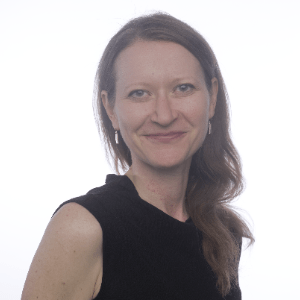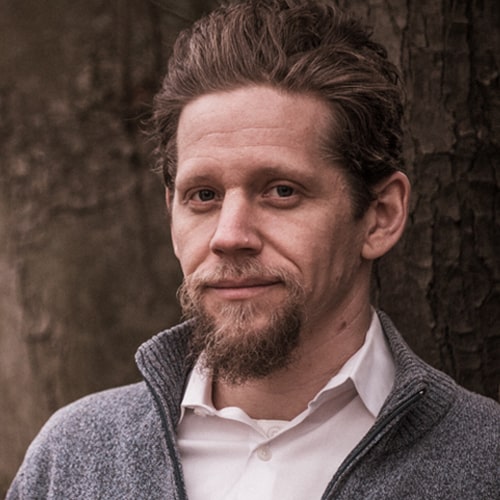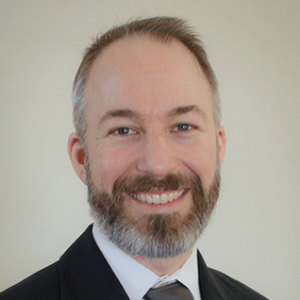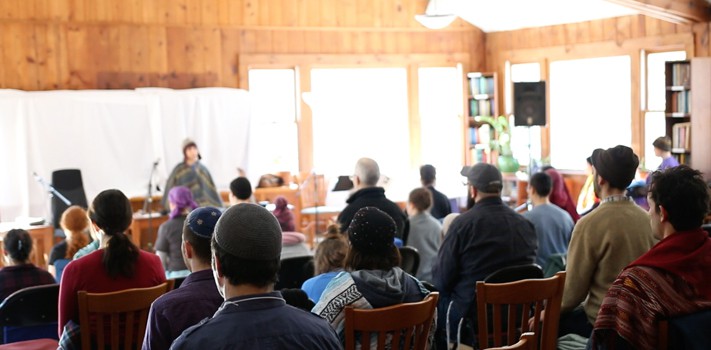Dec 25, 2022 - Dec 30, 2022 

Isabella Freedman Jewish Retreat Center, Falls Village, CT
Registration Closes on December 15
A week of silence, awareness, and insight.
Months later I am still accessing the deep peace I experienced on this retreat. I experienced total rejewvination – the reset button was activated fully!
Overview
The Hazon Meditation Retreat is an opportunity to slow down and explore life’s deepest truths in a warm and supportive Jewish environment.
Participants are guided through a daily schedule that includes several hours of sitting and walking meditation, soulful Jewish prayer (davennen’), supportive interview sessions with teachers, and optional yoga.
The main form of meditation taught on this retreat is mindfulness, an approach originally derived from Buddhist traditions but now widespread in secular, Jewish, and other contexts. Mindfulness brings forth the natural capacity to notice whatever is happening in your experience with kind, non-judgmental presence. It can lead to profound insights into your personality, the causes (and relief) of stress in your life, even the fundamental facts of existence itself. On this retreat, we cultivate and deepen mindfulness in forty-five minute sitting meditations, periods of walking meditation, and throughout the day.
This is also a Jewish retreat. In addition to daily davennen’ sessions in the Jewish Renewal style, we infuse our teaching with Jewish mystical traditions, contextualize our insights in Jewish language of holiness and the Divine, and build an inclusive Jewish community together. We welcome people with all types of Jewish observance and none, Jews and non-Jews, those who connect with “God” language and those disillusioned with religion, new and experienced meditators, and a community that is diverse in age, race, background, and sexual and gender identities. Throughout the retreat, participants are invited to explore the sacred in the diverse ways that speak to them.
This retreat is conducted in the tradition of our teachers, Rabbi David Cooper z”l and Shoshana Cooper, as well as our beloved co-teacher, Beth Resnick, who cannot join us this year due to family responsibilities. We hope to hold Beth’s heartful presence with us on this year’s retreat.

Registration
Registration Closes on December 15
Retreat fees – including lodging and kosher farm-to-table meals – begin at $620 per person. This does not include a program fee. The teachers offer this retreat on a donation (dana or trumah) basis. Donations for teachers will be collected at the conclusion of the retreat.
You will receive a confirmation email once you have registered and made a payment online or by phone. If you do not receive the confirmation email within 24 hours of registering, please call us at 860.824.5991 x0.
We strive to make our retreats affordable to everyone.
We believe retreats are important experiences to be shared. Inclusiveness is one of our core values. We strive to ensure that our retreats are as financially accessible as possible. The Tamar fund makes that aspiration possible. The Tamar Fund is in loving memory of Tamar Bittelman z’’l.Please be sure to read the application guidelines in the form below
See below for our amazing teachers, frequently asked questions, a few words from Rabbi Jay Michaelson, and the tentative schedule.
2022 Teachers

Miriam Eisenberger, LCSW is a mindfulness and somatic-based therapist, reiki master, sacred song and Jewish ritual facilitator, meditation instructor, guide in integrating plant medicine and ceremony work (mindfulelement.com). Miriam centers on discovering ways to utilize innate untapped wisdom as an ally in healing. She integrates Somatic Experiencing® & NARM trauma-informed modalities, mindfulness-based psychotherapy, teachings from a variety of spiritual traditions, and meditation instruction in her work with others. She has been teaching on residential silent-meditation retreats since 2018.

Rabbi Shir Feit is a musician, meditator, mystic, and misfit. Shir founded Kol Hai: Hudson Valley Jewish Renewal and was the first full-time Music Director of Romemu. Shir has released six albums of original music and performed with The Epichorus and the Darshan Project. Shir’s rabbinical ordination is from Reb Zalman Schachter-Shalomi z”l and the ALEPH Ordination Program, was a Wexner Graduate Fellow, and is a member of the Zen Peacemakers, having attended five Bearing Witness Retreats in Auschwitz-Birkenau.

Rabbi Dr. Jay Michaelson has taught meditation for twenty years in Buddhist, Jewish, and secular contexts. The author of ten books on spirituality and religion, Jay is an editor and podcast host at the Ten Percent Happier meditation startup, as well as a contributing writer to New York Magazine and the Daily Beast. Prior to that, Jay worked as an LGBTQ activist for ten years. An affiliated assistant professor at Chicago Theological Seminary, Jay holds a Ph.D. in Jewish Thought from the Hebrew University of Jerusalem. He is authorized to teach in the lineage of Ayya Khema by his teacher, Leigh Brasington, and was ordained as a rabbi by Rabbi David Cooper.

Robert Pileggi, LCSW (he/him) is a psychotherapist, meditation teacher, Gestalt Psychotherapy instructor, Interfaith minister, spiritual director, and hatha yoga instructor. Bob hopes to support people with finding greater ease with life in the moment, to connect to inner wisdom and strength, and to connect authentically with others. His work is informed by thirty years of social justice work, LGBT community involvement, 2.5 years as an essential worker in a public health center engaged heavily in crisis and grief counseling, Mindfulness-Based Stress Reduction (MBSR) instruction, officiating hundreds of life cycle rituals as an Interfaith minister; and a love of mindfully crafted documentary photography.
Frequently Asked Questions
What is the schedule of the retreat?
This retreat is five days of intensive meditation! But we promise, it is easier than it sounds. Each day includes five 45-minute meditation ‘sits’, four periods of walking meditation, group davvenen’ (Jewish prayer), an instructional class on meditation practice, an optional yoga class, an evening talk, and other sessions. The schedule is based on many years of experience and careful attention to the conditions conducive to developing calm and insight. Many retreatants find it helpful to “surrender” to the schedule, and, in general, we recommend that. Others find their own pace and level of intensity. You’ll receive a full schedule on arrival (please arrive Sunday between 2 and 5 pm so you have time to unpack before retreat begins).
Is it really in silence?
Mostly yes! To slow down the mind, build calm and mindfulness, and open the heart, we will be in “friendly” silence from Sunday evening until Friday morning. The practice of silence is an ancient one in many traditions, and it allows the attention to turn inward. However, there will be plenty of opportunities to use your voice, such as davvenen’ and interviews with teachers. For emergencies, you can leave notes for staff and teachers, and some communication may be necessary in those circumstances.
No electronic devices are to be used while you are on retreat. Turn your phone off and put it away! We’ve found that even brief check-ins create a lot of disturbance in the mind that can make your practice much more difficult. If you must use a mobile device for family or medical reasons, you should do so where other retreatants will not see or hear you, such as your car or away from the retreat buildings. Even reading can stir up the mind, so we strongly advise you not to do so, and request that you not do so where others can see you.
Often silence indicates cold distance, but this is meant to be a loving silence. While we do request that you refrain from trying to communicate with others, even non-verbally, occasional, accidental contact is okay. During sitting meditation sessions, however, we are more careful about limiting any sound (sniffling, shifting position, moving around) that could disturb others, and restrict entry to the meditation hall after sessions have begun. Mostly, we hope you will come to experience this silence as warm, friendly, and supportive.
How can I communicate with teachers or staff?
There will be two group interviews during the week when you can speak with teachers in a small group setting. For emergencies, there will be a box in the lobby where you can leave notes for staff and teachers. All notes will be read, but most will not be answered, in order to support your inner silence. They should be used for pressing matters only. Please do not leave notes for other retreatants, as this could disturb the other person’s retreat.
I'm Orthodox - what should I know?
We’re happy to have you! Orthodox participants join us every year. Our facilities are certified Kosher by the HKC. Please note that all services, Shabbat included, will be in the Renewal tradition and feature instruments and amplification without a mechitza. Organized Orthodox prayer services are not provided on this particular program. We recognize the importance of religious practice, and encourage you to contact us with questions so that we can discuss expectations and support you as best as possible.
May I leave the retreat early?
No. Failure to stay for the entire retreat, without prior arrangements, may result in being prevented to register for the retreat in the future
What should I do when I'm not meditating?
That is a trick question! You can practice mindfulness from the moment you open your eyes in the morning until the moment you close them at night. So really, you’re never not meditating. It will help your practice immensely if you regard it as continuous, all the time. No matter what activity you are doing—eating, showering, walking to your room—you can do it mindfully and keep your practice going. Many people find it helpful to walk and move more slowly than normal on retreat. This may look strange at first, but quieting the body quiets the mind. Enjoy!
What about reading and journaling?
We generally recommend against reading on retreat. It’s fine to jot a few notes during your retreat, but long journaling is generally not recommended. These activities tend to stir up the mind, and can be unhelpful distractions. If you do choose to engage in some inspirational reading or to journal, we ask that you do so in your room and not in the meditation hall, lobby, or other communal spaces.
Are there any rules for the meditation hall?
From the moment the bell is rung at the start of a sit until it is rung again at the end, there should be no entering or exiting the meditation hall. As you’ll find out, even quiet sounds can be very disturbing. Please arrive a few minutes early for each sit so that you can settle in before the bell rings. If you are even one minute late, you will find the door closed. Do not open it. Instead, please sit somewhere other than the meditation hall. Except in cases of physical or emotional necessity, or if you think that sounds you are making are disturbing others, please do not leave the hall before the ending bell has rung, and if you do leave, do not re-enter.
We ask that you remove your shoes before entering the hall and that you enter quietly and carefully so you don’t disturb other retreatants. It’s fine to bring water into the hall as long as it is in a closed container. Please don’t bring any other food or beverage into the meditation hall.
Please also be aware that sound carries into the meditation hall from the hallway.
How should I prepare for retreat?
No special preparation is necessary. It will help your practice if you get plenty of sleep this weekend, and if you’re not doing anything too wild and crazy. Just come with an open mind and generous heart!
Why a Jewish Meditation Retreat?
Read more in this post by Rabbi Jay Michaelson
Schedule
2:00-5:00 PM – Arrival & Check-In
5:45-6:45 – Dinner
6:00 – Logistical orientation (at dinner)
7:00 – Opening program and Welcoming of Silence
8:30-9:30 – Walk and Sit
Monday – Thursday, December 26-29
6:00-6:45 AM – Early Sit
6:45 – Wake-up Bells
7:00-8:00 – Yoga or Sit
8:00-8:30 – Breakfast
8:45-10:00 – Davvenen’ (Musical Prayer Service)
10:00-11:00 – Walk/Stretch and Sit
11:00-11:45 – Walk or Group Interviews
12:00-12:45 PM – Sit with Practice Instructions
12:45-1:30 – Lunch
1:45-3:45 – Sit and Walk
3:45-4:30 – Walk or Group Interviews
4:45-5:45 – Yoga or Sit/Contemplation
5:45-6:30 – Dinner and Walk/Stretch
6:30-7:45 – Sit and Walk
7:45-8:45 – Teaching
8:45-9:30 – Walk/Stretch and Sit
Friday, December 30
6:45 AM – Wake-up Bells
7:15-8:00 – Optional Sit
8:00-8:30 – Pack out of rooms
8:30-9:00 – Breakfast
9:00-10:00 – Abridged Davvenen’
10:00-10:15 – Stretch
10:15-11:30 – Closing Program
11:45 – Lunch and Departure
Tzedakah/Dana for Teachers
Please note that registration covers only room and board for this retreat. At the end of the retreat, a request will be made to all participants to contribute additional funds to pay our teachers and cover their travel expenses. The faculty relies solely on these voluntary contributions for payment and to cover expenses.
If you’re new to Isabella Freedman, check out our Frequently Asked Questions.




